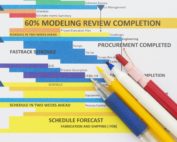When working on a schedule to determine its integrity sometimes it can be useful to work out potential problem areas for certain tasks, so for example if you have a schedule where you have found a lot of missing logic, is this because hard constraints have been set instead? Do you have any critical activities that have insufficient detail, in other words they are too long, that could cause delays to the schedule further down the line.
![]() Comparison analysis allows you to check this. By choosing one metric and comparing it to another you can see where each occurs in a project or snapshot and where both occur.
Comparison analysis allows you to check this. By choosing one metric and comparing it to another you can see where each occurs in a project or snapshot and where both occur.
Comparison Analysis is useful to check multiple analysis criteria, you may want to look at the progress of a schedule over time and look at trends.
![]() Trend Analysis in Acumen FUSE allows you to view trends across the lifespan of a project.
Trend Analysis in Acumen FUSE allows you to view trends across the lifespan of a project.
You firstly need to import a project and at least one snapshot, remember a snapshot is showing the same project but at a different time period. You can then choose the metric view you wish to work with and perform Trend Analysis. This allows you to compare the metrics of the project and each snapshot either textually or graphically and review improvements or not over time and make any necessary remedial action.
We hope you enjoyed this brief overview of Comparison and Trend Analysis in Acumen FUSE. But believe us, there is plenty more that this tool can do to help you develop more robust and reliable schedules.
For any of you already using Acumen FUSE or thinking of using it, Underscore Training are an Accredited Deltek Training Partner, which means that we have the support from Deltek and also feedback into the tool and future releases while still being an independent learning and development provider. We offer a two-day Acumen FUSE training programme which looks in depth at the different elements of the tool and gives participants the chance for hands on use in a safe environment. Common feedback from those attending the course was that they were amazed at how much it could do and realised they were only using perhaps 10% of its capability!
To find out more about our course please click the following link Acumen FUSE. For a full list of public programme dates please see our website, Public Programme Dates.
Alternatively, if you have a group requiring training we can organise dates to suit you.
Please feel free to get in touch if you have any questions on 0203 9503730 or by email on training@underscore-group.com.
Read Next
Schedule Risk Analysis: Risk Register Setup
Welcome to the final blog in our series on Schedule Risk Analysis. Over the past few weeks we’ve explored the topics of schedule integrity, uncertainty and three-point estimating, and running analysis. To round off, [...]
Schedule Risk Analysis: Running Analysis
Welcome to our latest blog in our Schedule Risk Analysis series. So far, we’ve discussed schedule integrity and uncertainty and three-point estimating. This week we’re exploring running analysis; in particular we’re focusing on how [...]
Understanding Schedule Risk Analysis: Uncertainty Analysis and Three-Point Estimating
Welcome to the third blog in our series exploring the key principle of schedule risk analysis. Last week we discussed the need for schedule integrity; this week we dive deeper into the topic of [...]
Understanding Schedule Risk Analysis: Schedule Integrity
Before you start to perform a schedule risk analysis, it’s first vital to understand Schedule Integrity so that you can adequately assess how ‘good’ your schedule is. If you want to feed your data [...]
Understanding Schedule Risk Analysis Blog Series
Welcome to our new blog series exploring the principles and practicalities of schedule risk analysis. Over the next few blogs we’ll be looking at key concepts such as Uncertainty Analysis and Three-Point Estimating, Running [...]
Deltek Acumen FUSE® – Logic
Following on from my first blog about Schedule Diagnostics. We have now imported our schedule and looked at some of the problem areas but perhaps we want to explore the logic in a bit [...]






